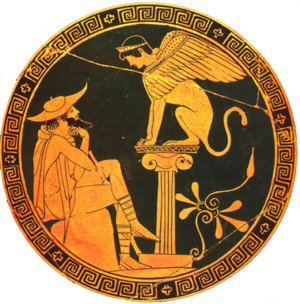Oedipus Rex: Difference between revisions
No edit summary |
No edit summary |
||
| Line 52: | Line 52: | ||
Archetype of drama? Hero’s quest for himself. | Archetype of drama? Hero’s quest for himself. | ||
[[Oedipus the King Summary]] | |||
== Questions for Consideration == | == Questions for Consideration == | ||
Revision as of 12:03, 14 December 2004
Oedipus the King, by the tragedian Sophocles, is based on a legend deeply rooted in the cultural identity of Athens. The myth of Oedipus contains a historical and religious authority based on the cultural values of an oral tradition. It concerns the relationship between humans and their gods and, perhaps more importantly, primal hopes and fears that unearth a terror and despair normally buried in human consciousness. Oedipus is a typical Athenian who commits the most egregious of human taboos: incest and patricide. Within the character of Oedipus are both the faults and virtues of the Athenian people. Some critics suggest that Oedipus might be a warning to Athenians that have ushered in a new era of intellectualism.
Character Traits
- Conscientious and patriotic ruler
- Quick to rage — anger — does not listen to anyone
- Confidence in human intelligence — self-confidence
- Man of action and decisiveness, even if imprudent
- Obdurate — Jocasta says “You’re so unbending” (l. 769).
- Courage in the face of despair
- Impiety — disdainful and supercilious
- Wants to know the truth at all costs
Much of the tension in Oedipus the King revolves around dramatic irony: the gap between the one meaning known by the audience and the other known to the players:
- Every step prompted by his intelligence is one step closer to tragedy
- His knowledge is ignorance
- His clear vision is blindness
Oedipus falls because of the man that he is, not through some random event in nature or fated outcome. His self-discovery comes at a huge cost: his own destruction. Although the oracle predicts what Oedipus will do, it does not determine the latter’s actions. Oedipus has erred in his faith in human intelligence; there are powers in the universe that are beyond our control and our understanding.
Aristotle mentions Oedipus eleven times in his Poetics. Aristotle’s obvious favor of Sophocles’ play suggests that it is the measure of all tragedy.
Free Will versus Fate
“Even if everything is determined, we have no way of knowing what the total pattern is, so we must act on our own best judgment; free will is, therefore, a necessary illusion. Apparently wise men attain some insight into this pattern (or are given it by the gods), but all of us have the freedom to disregard such insight, follow our own desires, and suffer the consequences.” Walter Agard’s The Humanities for Our Time (1949).
The concept of human suffering loses all significance if humans have no free will.
“The central idea of a Sophoclean tragedy is that through suffering a man learns to be modest before the gods.” Bowra
“His Oedipus stands for human suffering, and he neither attempts, like Aeschylus, to justify the evil, nor presumes, like Euripides, to deny its divine origin” J.T. Sheppard
“Sophocles’ difficulty is the problem of suffering, as Aeschylus’ is the problem of sin.” A. Zimmerman
“It’s all chance, chance rules our lives.” Jocasta, l. 1070
“I count myself the son of Chance.” Oedipus, l. 1188
Themes and Motifs
- Sight and blindness
- Light and darkness
- Historia — a free spirit of inquiry
- Knowledge comes only through suffering
- The responsibility of humans for their own acts
- The error of setting human reason above obedience to the gods
- Consequences of excessive pride
- Ship and navigation metaphors (e.g., ll. 1010-11; 1454)
Chorus — present and objectively severe and conventional, gradually growing more troubled and anxious, and finally into utter despair.
Archetype of drama? Hero’s quest for himself.
Questions for Consideration
- Many consider Oedipus the King as the greatest of the Western tragedies. Even if you are not familiar with other Greek tragedy, consider the greatness of Oedipus the King from your own perspective. What themes common in the tragedy resonate for us today?
- All of the crucial action of the play takes place off stage: Oedipus' killing of his father, etc. Consider the dramatic effect of this decision: what is, therefore, highlighted if not the egregious acts committed by the protagonist?
- Even though during his investigation, Oedipus begins to suspect the truth of the situation, yet he pushes on to prove the terrible truth. What does this say about Oedipus specifically and the tragic hero in general? Does this shed any light on Oedipus' eventual death?
- What is Oedipus' tragic flaw? Is there only one?
- Professor Literary Critic states that "to Sophocles, man has become an emancipated individual with a free will who cannot excuse his deeds by blaming Fate, the gods, or oracles. Reason is thus man's highest possession and greatest power." Discuss the contrast of fate verses free will in Oedipus the King.
- When Oedipus discovers his crimes, he blinds himself. Discuss the symbolic significance of this action. What does this act say about vision in general? (Perhaps start by thinking about that other blind character have we met this semester...)
- If Oedipus represents both the best and the worst of his culture, what values can we infer from our reading of the tragedy?

